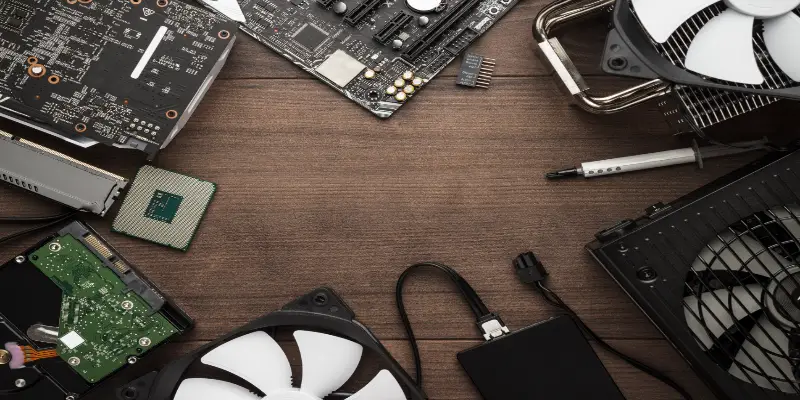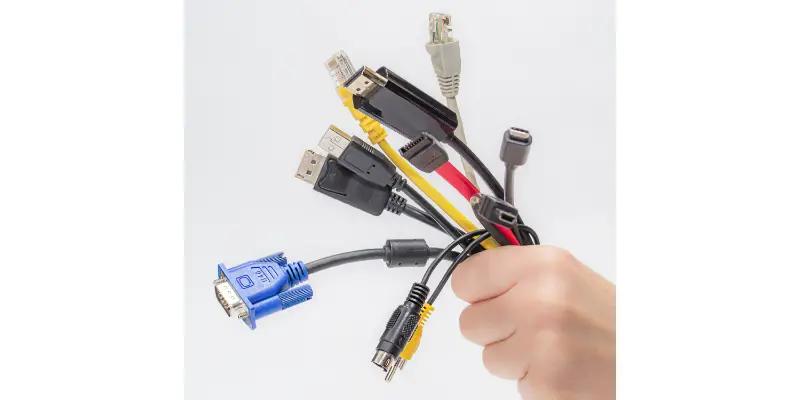Disclaimer: This post may contain affiliate links, meaning we get a small commission if you make a purchase through our links, at no cost to you. For more information, please visit our Disclaimer Page.
Do you have an old computer or a pile of computer parts that you don’t know what to do with?
You can store your unused PC parts in a dedicated space in your home. Pay attention that they are properly wrapped in safe packaging. If you don’t have enough storage room in your home, choose a dedicated off-site storage unit.
Table of Contents
How Do You Store Unused Computer Parts?
If you have an unused computer part, it makes sense to store it until you need it. It can be a new laptop or spare part. Nonetheless, stashing electronics isn’t like stockpiling food.
In this context, unused means you won’t be using them for years to come. If you’re going to use them monthly, they’re rarely used. You might need a different approach based on the usage frequency.
How To Store Rarely Unused Computer Parts
Hardly used computer parts are straightforward to store than never-used ones. You needn’t worry about anything other than storing it in a dry and clean place away from harm’s way. It’s best to keep these computer parts in an accessible room.
With motherboards and any other battery-powered computer parts, you may need to remove the batteries before storing them. That’s all to it. You may need to keep a watchful eye on them to prevent any damage that can go under your radar.
How To Store Unused Computer Parts For The Longer Term
Here’s where things tend to get out of hand. If you recently upgraded your RAM, motherboard, or graphics card, you probably have no use for the old parts. However, you might want to keep them despite having no advantageous use for them.
In that case, you may need to pay attention to these two factors:
The Effect Of Heat On Computer Parts
The first enemy of used and unused computer parts is hot weather.
Metal constitutes a big part of the components inside computer parts. In summer, metal tends to expand. In winter, metal tends to contract.
These changes might be invisible to the naked eye, but they impact all electronics with metal components. For example, a motherboard contains metals, glass, plastic, and more. These parts are vulnerable to the changing heat conditions around the year.
Eventually, the parts will break, electricity circuits crash, and the welds might crack. That’s why it’s vital to keep unused computer parts at a stable room temperature. It shouldn’t be too hot nor too cold.
If that’s not possible, try to find a place with as many stable weather conditions as possible. Avoid the attic because it’s too hot in summer and too cold in winter. Garden sheds and garages are awful places to store unused computer parts as well.
The ideal places to store unused computer parts might be a cupboard in your bedroom, a storage room under the stairs, or a dedicated storage room in your house.
The Effect Of Humidity On Computer Parts
The second enemy of used and unused computer parts is humidity.
Humidity can cause irreversible damage to stored unused computer parts. Humidity carries moisture, which is water. Water and electrical components usually don’t go well together.
That’s why it’s crucial to store computer parts in a dry place away from moisture. That’s also why tucking away unused computer parts in the basement isn’t a good idea. Unless your basement is clean and dry.
Many people store their unused computer parts in airtight containers with a desiccant. A desiccant is a material that absorbs moisture out of the air. It’s that small packet of plastic-looking pellets you see in the box with the new items you buy.
If you can get your hands on an airtight plastic box, it’ll serve you well for storing your unused computer parts. With a desiccant thrown into the mix, you don’t need to worry about moisture anymore. If an airtight container isn’t available, try to keep the unused computer parts away from any source of dew.
Storing Unused Battery-powered Computer Parts
Battery-powered computer parts like the motherboard are tricky to store. Any battery tends to break and leak with a prolonged time of neglect. It applies to all types of batteries.
So, it should be at the forefront of your storage strategy. First, you need to remove the battery out of the computer part and store it separately. Second, you need to insulate the battery slot with insulation tape.
As for the battery, you might want to store them in its own airtight box. Make sure to secure the batteries away from heat and moisture because they might explode. Next, you may want to consider zip-lock bags for storing unused computer parts.
How To Store Hard drives
Hard drives are also sensitive to storage. The data get corrupted, it won’t start, it can even crash. Since you may need the stored data at some point, you may want to be extra careful with packing hard drives.
Firstly, don’t store it indefinitely because it may corrupt the electromagnetic field and boards. You’ll need to power it up and carry out some operations to make sure it’s working. The same applies to other storage units like CDs, flash drives, and external hard drives.
You may also want to store important data using a cloud service just in case. As for your old hard drive, you should put it in a dark, dry place with a stable temperature. Otherwise, you’ll damage it.
Airtight and anti-static bags are an excellent idea to store unused computer parts. However, if you have access to the original package that came with the computer part, it’ll serve you well. Seal your computer parts and put them safely in the original box.
That way, you can keep them for the longest time possible. If you don’t have access to the original package, a cardboard box will do. If possible, wrap the computer part with bubble wrap just in case you drop the container.
How To Store Unused Computer Cables
Storing unused computer cables needs a sense of organization first and foremost. What you should know about computer cables is that they tend to get tangled when you’re not looking. They also don’t like to be under heavy objects because the weight can damage them.
So, you may need to untie the cables to remove knots. Then, wrap them gently around your palm. Lastly, label each one of them to know which is which.
You can store unused computer cables in a wastepaper basket, plastic box, or bin. You can also stuff them inside used paper rolls and store them upright in a drawer. Also, you may need to keep them away from heat and humidity.
As you can see, you got no particular precautions to store your unused computer cables, cords, and wires. However, you may need to keep them organized, which might be time-consuming.
Conclusion
The first and last rule to store unused computer parts is keeping them in a dry, air-conditioned, and dark place. Some computer components require more attention than others, but the same rules will always apply.
One should keep unused computer parts away from heat and humidity. These two will corrupt computer parts more than other things.
The best places to store unused computer parts are inside your house. Ideally, you should keep them in a dedicated storage room. If possible, with some temperature control mechanism in place.
If you have the budget, consider renting a dedicated storage unit with a self-storage service. These companies can provide a renting space according to your specifications. You might even find a specialized renting company for computer parts.
If you have trouble storing your unused computer parts, consider donating or recycling them. Amazingly, you don’t want to waste them. So, keep doing what you’re doing.
It’s good for the environment!


